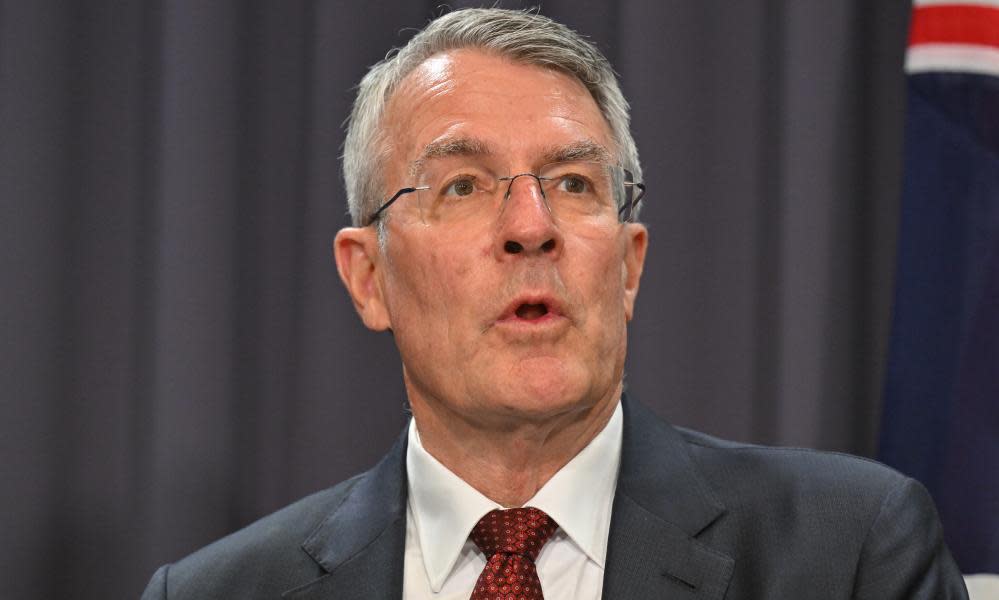Robodebt royal commission: Labor accepts all 56 recommendations in full or in principle

The Albanese government has agreed in full or in principle to all 56 recommendations of the robodebt royal commission, with the attorney general labelling the unlawful Coalition-era Centrelink scheme as “deliberate” and “calculated”.
The royal commissioner, Catherine Holmes, made 56 recommendations in July, including adopting more face-to-face services, reviewing how Services Australia interacts with its customers, a six-year limit on debt and an audit body for automated decision making.
The government said $22m would be spent over four years implementing each recommendation, though some anti-poverty activists and the Greens argued the government should go further. Separately, the government also rejected a “closing observation” from the report, which called for significant changes to the Freedom of Information Act (FoI Act).
The government services minister, Bill Shorten, pointed to a recent boost to Centrelink staff and the announcement of a new Services Australia advisory body as evidence the department was listening.
“What we’re doing is putting the ‘human’ back into human services – literally thousands of ongoing public servant positions have been created,’” he said.
The Australian Public Service Commission is investigating 16 individuals involved with the scheme, following referrals from Holmes.
The attorney general, Mark Dreyfus, declined to comment on the cases.
“This was not an innocent mistake, this was a deliberate, calculated scheme,” Dreyfus said. “In essence, people were traumatised on the off-chance they might owe money.”
The royal commission made a wide range of recommendations to improve Centrelink and the social security system, the public service and for government. These included rules around how legal advice is treated by government and the bureaucracy and more funding and powers for the commonwealth ombudsman. The government did not accept a “closing observation” from Holmes to amend the FoI Act so cabinet documents are only exempted from release if there is a clear public interest reason.
The Greens senator Janet Rice said the report and Labor’s response was a “positive step towards justice for those traumatised by the callous and illegal scheme, but it does not change our fundamentally broken social security system”.
Rice said Labor should “immediately suspend all debt-collection”. The government has suspended the unlawful method used in robodebt, but still conducts compliance and imposes debts where recipients have been overpaid.
In December Services Australia told Senate estimates it was pursuing more than 1 million people for debts worth $5bn .
The Antipoverty Centre spokesperson and welfare recipient Kristin O’Connell also called for the immediate suspension of all Services Australia debts until “a safe system can be worked out”.
“We call on the government to immediately cease raising and pursuing Centrelink debts until a safe system can be designed that does not recover money from people who can’t afford to live,” she said.
The former Coalition government launched robodebt in mid-2015 in an effort to save billions of dollars.
It issued debt notices to people identified through a process called income averaging, which compared income reported by Centrelink recipients on a fortnightly basis with annual tax office data.
More than $750m was wrongfully recovered from 381,000 people, with the royal commission hearing evidence of bureaucrats ignoring serious questions and advice about the legality of the “crude and cruel” scheme.
The scheme was ruled unlawful by the federal court in November 2019. A class action settlement of $1.8bn was reached between robodebt victims and the then-government in 2020.
The robodebt royal commission report also found elements of the tort of misfeasance in public office “appear to exist”, which could pave the way for further legal action.
Shorten also said two parents of people caught up with the robodebt scheme – Jennifer Miller and Kath Madgwick, whose sons Rhys Cauzzo and Jarrad Madgwick took their own lives while they dealt with Centrelink debts – were still considering civil proceedings.
- with AAP

 Yahoo News
Yahoo News 
